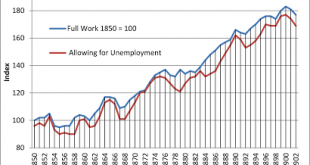Steve Keen speaks below on the catastrophe that is the Eurozone, and this is lecture 7 that is part of Keen’s course at Kingston University in the UK.[embedded content]
Read More »Seymour Hersh on US Policy in Syria
A truly fascinating interview with the investigative reporter Seymour Hersh on US policy in Syria in the videos below. More here. Seymour Hersh’s article “Military to Military” in the London Review of Books is here.If true, we see here how US foreign policy is much more complex than people both on the left and on the right think.[embedded content][embedded content]
Read More »Empirical Studies showing that Prices are Correlated with Labour Costs do not Prove the Classical Marxist Labour Theory of Value!
I can’t count the number of times some absurd apologists for Marxism cite some paper in my comments section showing prices are correlated with labour costs – as if this proves the classical Marxist labour theory of value.It does no such thing. The Marxist labour theory of value says much more than this.In volume 1 of Capital, the “law of value” expounded there was later described by Marx in these terms: “The assumption that the commodities of the various spheres of production are sold at...
Read More »When the Word “Racist” Loses all Meaning
It is illustrated perfectly by this news story here.So a Mexican restaurant at a British university hands out sombreros to students as a “celebration of Mexican culture” (according to none other than the restaurant’s general manager). In our truly bizarre politically-correct culture, this is condemned as “racist.”This is an utter abuse of the term “racist,” and an insult to people who have genuinely experienced real racism.What is racism, if it is to have any coherent, sensible and defensible...
Read More »Dave Rubin interviews an Iraqi Dissident and Atheist
Dave Rubin interviews Faisal Saeed Al-Mutar, an Iraqi dissident, human rights activist and atheist in the fascinating interview below, which should be of great interest to people on the left and right, for its many interesting insights.Dave Rubin is a liberal who has a series of great interviews in his show The Rubin Report, and he is a strong critic of the regressive left.[embedded content]
Read More »Engels’ Famous Challenge in the Preface to Volume 2 of Capital on the Transformation Problem
In the introduction to volume 2 of Capital written on May 5, 1885, Engels made this famous challenge: “The Ricardian school failed about the year 1830, being unable to solve the riddle of surplus-value. And what was impossible for this school, remained still more insoluble for its successor, vulgar economy. The two points which caused its failure were these:1. Labor: is the measure of value. However, actual labor in its exchange with capital has a lower value than labor embodied in the...
Read More »Engels on Subsistence Wages
In Friedrich Engels’s Herr Eugen Dühring’s Revolution in Science (1894; first published in 1878), he argued that industrial capitalism, partly by means of automation and use of machines, drove workers’ wages down to a subsistence level and tended to keep them there: “Thus it comes about that the excessive labour of some becomes the necessary condition for the lack of employment of others, and that large-scale industry, which hunts all over the world for new consumers, restricts the...
Read More »Engels’ Failed Prediction of Revolution in the UK
In 1886, Engels made the following prediction in his introduction to the English translation of volume 1 of Marx’s Capital: “The time is rapidly approaching when a thorough examination of England’s economic position will impose itself as an irresistible national necessity. The working of the industrial system of this country, impossible without a constant and rapid extension of production, and therefore of markets, is coming to dead stop. Free trade has exhausted its resources; even...
Read More »Marx’s Capital, Volume 1, Chapter 9: A Critical Summary
Chapter 9 of volume 1 of Capital is called “The Rate of Surplus Value” (Marx 1990: 320), and it discusses aspects of surplus value.Marx divides the chapter into four sections: (1) The Degree of Exploitation of Labour-Power;(2) The Representation of the Value of the Product by Corresponding Proportional Parts of the Product;(3) Senior’s “Last Hour”(4) The Surplus Product. A section by section summary follows.(1) The Degree of Exploitation of Labour-Power Surplus value is generated in...
Read More »Some Early Critical Reviews of Volume 3 of Marx’s Capital
Here are some here: Sombart, Werner. 1894. “Zur Kritik des ökonomischen Systems von Karl Marx” [Toward a Critique of the Economic System of Karl Marx], Archiv für soziale Gesetzgebung und Statistik 7: 555–594.Lexis, W. 1895. “The Concluding Volume of Marx’s Capital,” Quarterly Journal of Economics 10 (October): 1–33.Schmidt, Conrad. 1895. “Der dritte Band des Kapital,” Sozialpolitisches Zentralblatt 22 (25th February): 254–258.Sorel, G. 1897. “Sur la théorie marxiste de la valeur,” Journal...
Read More » Socialdem. 21st Century
Socialdem. 21st Century

